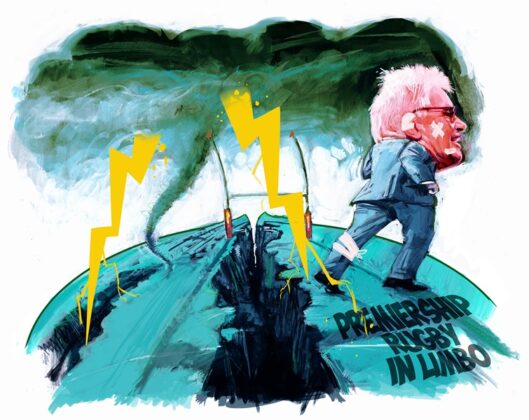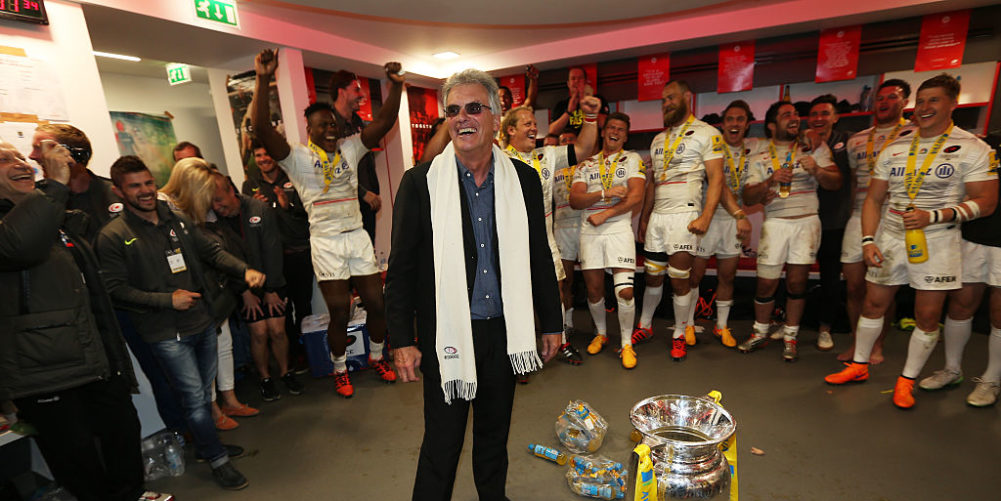The resignation of NIGEL Wray as Saracens chairman last Thursday was a clear signal that the salary cap fiasco engulfing the club – and jeopardising the Premiership‘s credibility as a professional league – must be put in perspective and resolved urgently.
If not, there is a danger that the toxic storm of recriminations it has unleashed will continue for the rest of this season at the very least – and in the process do lasting damage to the reputation of the Premiership.
The decision by Wray – since a disciplinary panel fined Saracens £5.36 million and docked them 35 points – to shelve travelling to other Premiership grounds to support his side because he felt unwelcome is a sad commentary on the state of the elite English league.
While Wray shoulders significant blame for being ‘reckless’ in breaching the salary cap by setting up co-investment companies with players, he is not alone in being at fault.
The bottom line is that PRL’s handling of the affair so far has been disastrous, and if it does not alter course it could result in fans and financial backers alike becoming disillusioned.
The first issue that has to be tackled is whether Saracens, as the first Premiership club to be charged with player payment breaches, merited being given a fine of over £5 million – especially as they were exonerated of any attempt to hide the existence of the co-investments after registering them at Companies House.
There has been a widespread failure to recognise that this is by far the biggest salary cap sanction ever handed down by a disciplinary panel in any team sport anywhere. Even hugely lucrative American pro sports have never incurred a punishment of the severity of the one given to Saracens.
The biggest salary cap fine in American football came in 2004 when the Denver Broncos were fined £1.4 million ($1.9m) for skirting the salary cap by deferring £22m in payments to two players from 1996-98.
The biggest in basketball was when the Minnesota Timberwolves were fined £2.6m ($3.5m) by the NBA in 2002 for going over the salary cap.
In Australian pro sport the fines have been considerably smaller than that. The biggest was a £900k penalty given to the Melbourne Storm rugby league side in 2010 for breaches of the NRL salary cap over five years, while in Australian Rules the biggest salary cap fine was the £495k slapped on Carlton in 2002.
These comparative figures raise serious questions over how the independent panel, chaired by Lord Dyson at the behest of PRL, arrived at the salary cap tariff for the Saracens breaches which was at least double those seen as appropriate by much richer sports like American football and basketball.
Saracens must now have deep regrets about agreeing to the disciplinary structure proposed by PRL, and then not going to appeal. So do many supporters of the game – not least because of the almost total absence of detailed information about how and why the independent panel came to its conclusions.

It is interesting that some legal commentaries on this case have commented that the lack of facts is regrettable.
It is also, surely, part of the remit of PRL as the administrative body of the Premiership clubs to ensure the integrity of the league going forward by being open about its procedures.
It was also incumbent on PRL to advise Saracens to make whatever changes are required to comply with the salary cap immediately – and for its salary cap manager to request the financial details verifying that the club has implemented them.
Instead, we have had a vacuum of information, in which PRL has failed to take the initiative – including not being willing to confirm if it is undertaking a mid-season audit of Saracens.
Instead, since the ruling, Saracens have played a further five matches in the Premiership without any announcement from PRL confirming that they are within the cap.
This failure to resolve the compliance issue has the potential to scupper the whole Premiership season. It means that if Saracens fight their way off the foot of the table there will be nothing to stop the club faced with relegation launching an appeal against going down based on the north London club not being within the cap.
Given the current mess presided over by PRL, nobody could blame them for doing so. However, any question that this is going to be used as an argument for ring-fencing the Premiership – as mooted by some commentators – would create another incendiary issue.
The Saracens salary cap breach, and a lack of regulatory system which is fit for purpose, is entirely a Premiership problem. Therefore, it should not impact in any way on promotion-relegation this season, irrespective of which club is relegated.
Decisions regarding promotion-relegation are in the RFU‘s jurisdiction, and its chief executive, Bill Sweeney, should take this opportunity to make it crystal clear to PRL and its member clubs that there will be no change to one up, one down for this season – and beyond.























